13 Tzameti is a French-Georgian co-production. I don't know which filmmaking god was playing connect-the-dots with a map of Europe on this one, but I'm extremely glad it took the effort. Maybe the title is meant to be read as 'Treize Tzameti', a mixture between the two countries' words for the number thirteen; they sure do look alike when written side-by-side like that, all those 'T's and 'Z's and assorted vowels— but if the intent is consonance, why use the digit form? It's like that on the poster too:
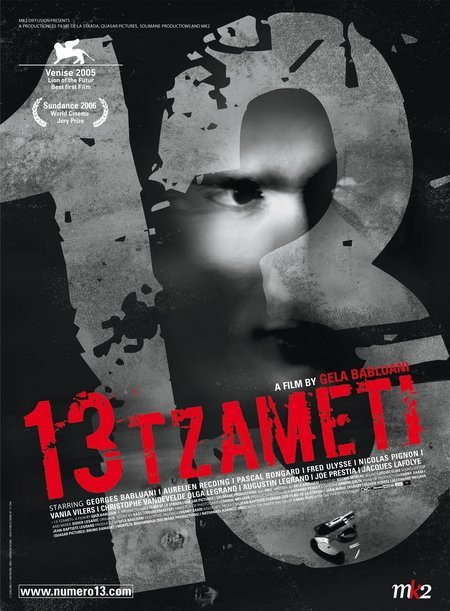
Even weirder, the title seems to have echoed itself once again and become '13 13 Tzameti'— all there in grey and red. There's a mystery that needs solving with the title of this film, there really is. Although the number thirteen has plot relevance, I'm not sure the truth behind this one can be puzzled out without finding out what was going on behind the scenes all the way back in 2005. All this strangeness must be down to Gela Babluani, I suppose.
Someone must have realised the trouble, as the American remake (with the same director) dropped the “Tzameti” and took the name '13', unfortunately swapping redundancy for forgettability. A quick IMDB search for films entitled '13' offers up around twenty others with the same exact title; hundreds with at least those digits in the name. While it's easy to poke fun at a film with a title directly equivalent to “13 Thirteen”, at least having two thirteens might be doing something to help it stand out from the crowd. Maybe they should have gone with 'Twenty-Six' instead, ha ha ha ha ha.
So, which is it? Is 13 13 Tzameti (I'll cut that out now) only redundant or forgettable too?
It's neither, silly.
Not once it reaches the twenty-five minute mark, anyway. 13 Tzameti (it's taking real effort not to colour that in) has perhaps the most drastic yet imperceptibly placed dull-to-thrilling moment I know of in a movie. It's somewhere in the 25:00-30:00 timestamp range where it grips me, but exactly where, I just don't know. Everything up to that, although it sets a mood, it's not what I love about this film. By the end of the ninety minutes, you're just not going to care all that much about how that one drug addict fell over on the beach back at the start. So, I'll sum up the boring/introductory facts quickly:
This film was produced in greyscale in the year of our Lord two-thousand and five anno domini dot com. This seems like a poor choice at first, taking just another element of vibrancy out of an already-slow beginning, but it really does begin to pay off once we reach... The pay-off.
Sébastien, our hero, is working as a roofer in modern-day France and sending money back home to his family. He's twenty-two. He's got some curiosity and you really begin to root for him. We get a lot of close-ups of him brooding towards some place off-screen, which really does a better job characterising him than it ever should have done. For a protagonist of such few words, you absolutely get to know him. A really good guy.
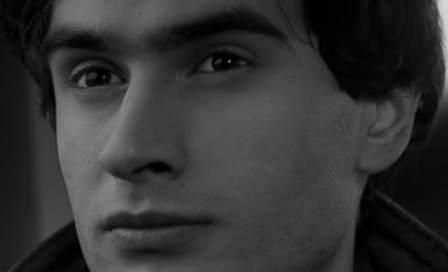
"That's really something. Some people are twenty-five or thirty. But to be twenty-two... That's amazing." — Sébastien's employer. For a film that isn't much about talking, this one sure does have some memorable lines. I'm never going to be able to look at all those amazing twenty-two-year-olds the same way.
Sébastien, our fool, steals a letter about a mysterious job opportunity from the man whose roof-hole he's fixing. Granted, he'd just died from an overdose in the bath (not Sébastien, his employer) and could no longer pay out, but looking at another person's post always makes a crummy impression. Seb is still a good guy, though.
Sébastien gets a haircut and starts following the directions in his dead employer's correspondence, presumably because he's that desperate for money. Literal compass directions, apparently, since we've got ten minutes of runtime spent travelling to the place he needs to go. I'm told this is a technique that writers and filmmakers like to use sometimes, but this thing you humans call "building tension" frightens and confuses me.
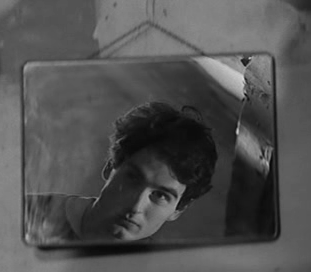
We don't talk about pre-haircut Sébastien.
It's midway through this journey, shortly after Seb shakes a group of mysterious men who've been tailing him (maybe attach "mysterious" to every plot-related noun in here) that things start to get interesting, but before we get onto that, I should mention the music— it's maybe a shame such excellent music is overshadowed by what's happening onscreen for the majority of the film. Here, though, in these beginning sections? The music is the aspect that grabs me the most. I could listen to this stuff all day; low string instruments are the key to my heart. I'll not link the whole soundtrack here, but— whoops.
The standout track has got to be You Wanted to Travel Blind, a crawling tune that gives the feeling of sneaking through some murky alleyway in an anthill-city of secrets. Or something. I'm not a professional imagery designer unless you're hiring. Anyway, take a listen. It's by a (possibly one-person) band named East, an offshoot of a (possibly two-person) band named Troublemakers. I kind of like their stuff too. Every day is just an extension of yesterday, they've got us there. I get such a bang out of it. Excuse me for putting on my Holden Caulfield hat in public like that, but sometimes he's just got the best words for everything. If it wasn't obvious, this site might just as well have been me talking about the music I like rather than films.
The title of that track— 'You Wanted to Travel Blind'— really is the best clue I've found to how exactly this film progresses from nought to one-hundred so fast. It's when, after following a set of increasingly dodgy instructions (getting off at an earlier station than his train ticket gets him, taking a taxi to a junction in the middle of nowhere, having to show identification in the form of a number 13) you really do begin to wonder whether Sébastien is going to be blindfolded. Kidnapped. Made to kill. Smuggle small arms. Donate organs. Suicide-bomb.
Those weren't commands, sit back down.
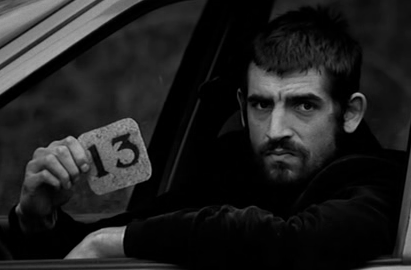
No, though, it's none of those things. When he's picked up by a terminally grumpy man who won't say a single word, you get the sinking feeling that he's gone too far to back out; this isn't an artsy black-and-white film, it's a gritty, crime-filled black-and-white film! Oh no! That's where the French-Georgian connection comes in: from France, 13 Tzameti takes its black-and-white-ness (noir-ness? Noirity?); from Georgia, its organised crime. That's not to say Georgia somehow has a greater crime rate than the rest of Europe (I wouldn't know) but Eastern European crime sure does have a different feel to its Western counterpart. I'm not an expert, but I'd guess the main difference is rain and concrete.
Speaking of crime, Seb begins to realise why you shouldn't steal someone else's private letters once he's strip-searched and has his shoe-heels broken as part of the check-over. By this point, I, and I imagine everyone else watching this, have started to pay attention. Even if we blinked and missed the moment this turned into a thriller, we're in for it now.
The Wikipedia article for 13 Tzameti, as of the time of writing, doesn't say what it is Sébastien gets himself involved with until the summary section. It's only "a dark and dangerous situation." Metacritic gets a step closer and summarises it as "a terrifying world where men bet on other men's lives." I'd like to be less surface-level than this with my wider reading, but there's genuinely very little out there on this film, which is sad.
If I were writing this page on the film's release, it plainly wouldn't fit in with the site; it would be too new and award-winning for that. The reason it's fallen to lus.neocities.org (fortunately?) is that I just can't find anyone giving it any love for at least a decade. So, these explanations are some of the best we have, but it seems as though there's an unspoken rule in all of them that to say what it is taking up two-thirds of 13 Tzameti is to ruin it all. I can sort of understand that idea. I'm going to ignore it, because I love this film and I love its lightbulbs.

I can't know why, but the mounting mystery suddenly resolves itself for me when yet another dour-faced goon escorts Sébastien into room thirteen of a large, empty house (a hotel?) out in the middle of the big dark spooky woods. Something about the surroundings and the numbers on the doors and the criminal elements, it all-at-once makes sense what job it is he's turned up for. I think that's probably a common reaction at this point, like there's been some subliminally strobing fill-in-the-blank image spliced in-between the frames of each scene change and all the people who picked up on it have just heard the trigger word, snapped out of the trance and realise what this has been leading up to. R _ _ _ _ _ _ r _ _ _ _ _ _ _. Seb, though, he's still not got it, and even when he explains himself to the man he'll be working under for the night, it still fails to dawn on him.
"If I don't suit you, I can leave."
"You can't leave now."
What if it doesn't suit me?
"You gotta play now."
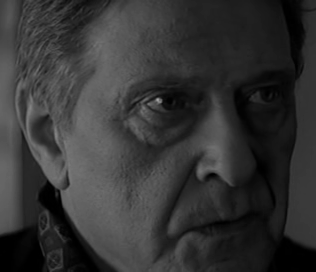
It's maybe a tangent, but I love this tiny conversation. Sébastien's new criminal associate never provides much real sympathy at any point from here on, but the little, tinsy smidge present here is enough to tide by. He knows Sébastien might end up a little broken thanks to what's coming up. So do we. Sébastien, finally, seems to want to back out of things, but it's all too late. I miss pre-haircut Seb, in a way.
A moment's escort, a sticker '13' slapped on Sébastien's back and we've finally got the answer. The game he's meant to play? Russian roulette. That's what the film is about. See, all that stuff about the distinctive character held by Eastern European crime wasn't just a veiled attack on the entire nation of Georgia. It wasn't that at all. In fact, if there's any message to take away from this, it should be Russia Bad, not Georgia Bad. But there, look. It was relevant! Russian! Roulette! CLICK CLICK CLICK BOOM, EVERYBODY.
It's time to switch to side two of this article's mixtape. Done? Great, because we'll be wasting no time starting this off with a bang ha ha ho ho.
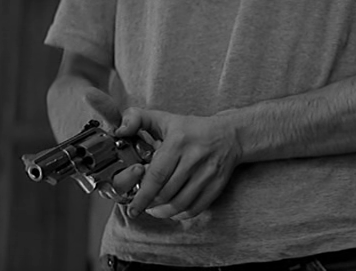
When the effective owner of Sébastien's life heads off into a separate room to make and take bets, it sparks an interesting question. Betting on Russian roulette. What's the point? Isn't it entirely up to chance? You can't be skilled at getting lucky enough to not have a bullet in the chamber. Except, 13 Tzameti changes things a little.
A ring of thirteen people, each with a gun to the man in front's head, a single bullet in the chamber. Everyone takes a shot. The ones who survive are given two bullets for the second round and a smaller ring of people, then three for the third, and presumably so on until the agreed end of the game or when everyone gets shot. It's odd, then, that as we move about the room and take a quick look at the other participants in the game, we see them treated more like athletes than slaves; it adds to how freakish it is to see the lives of grown adults thrown away on a useless murder-game like this given how their owners/employers/partners/coaches talk with them and make friends and wow, it's all so backwards, you begin to feel sorry for Sébastien not at least having someone to talk to like the other unfortunate players. There's really no derangement in this murder-game; it's not Saw, it's not Danganronpa, it's not any quirky-villainous horror movie bad-guy film where the villain has, oh, such complex motives for the violence happening on screen. It's miserable men and miserable money.

Damn, I should have ended on that. Off we go again, I suppose. One thing explained, at least— the greyscale, not only a component of how much noir this film has going on by this point, really helps emphasise how grimy everything is. It also leads to some lovely, shadowy images cropping up throughout the suddenly-crowded house where the game takes place. Eventually, you barely notice the colour is gone at all.
Although we only do get a brief look-around the ring of participants, we get a good idea of our competitors too. There's the fat man with very little fear, there's a small German whose 'coach' tells him to "be philosophical!" One man complains his gun is jamming and is given a new one. What a thing to ask, right? It's not as though having a gun jam is a disadvantage in this version of the game— all it means is that you're not going to become a murderer. It leads to a couple more questions: are these experienced players? How do you become experienced at a game where death is always more likely than not?
I'm sure some of the questions get to be obvious, anyone could meme the idea into a trolley problem-style issue with no trouble and there's no need for me to provide a list of all the things you might think about here. I do it, though, for a good reason, I promise.
That reason: all of these thoughts play out over a sequence of around three minutes as everyone gets into formation. Only three minutes. It's all such a strength. The music is gone. The organisers of the game are aching to get started, but they're not rushing anything. The minute Sébastien has trouble loading his gun, they're there to fix it and it's not a problem at all. Russian roulette isn't meant to have referees like this, let alone accommodating ones!
Before the guns go off, and before we begin to wrap up earlier than I might have liked— I'll stop putting it off soon, I really will— let's talk about this guy:
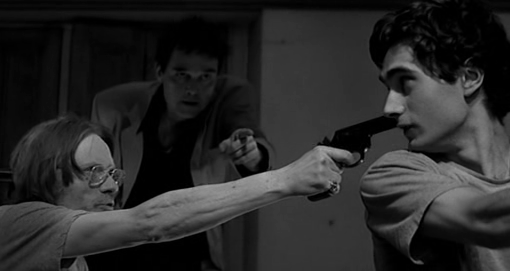
No, not the determined man with a gun to Sébastien's face. The one in the background with the index finger more intimidating than a million revolvers— he's the one credited as the 'Maître de Cérémonie'.
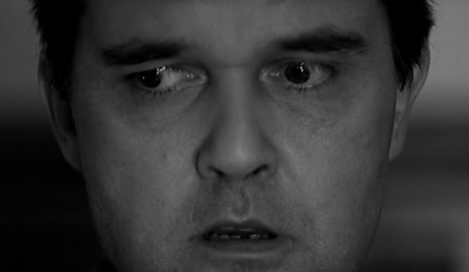
This man. He's the thing I remember most about this film (I say "remember" as it's been some time since I began writing this article, whoopsy-daisies): he's the source and embodiment of 13 Tzameti's very particular brand of ugly tension. The character performs no greater role than barking out instructions at the participants, that's true; the way this character (and actor!) does it, though, is in my opinion, what binds this film's spell together. Makes it spellbinding. Yeah. Words, that, all of it! He's a total grumpy referee. You half-expect him to give the participants red cards when they don't stay strictly on-form (if a red card were a gunshot, I suppose). When 13 Tzameti-style Russian roulette becomes an international sport, this stubby, angry Maître de Cérémonie is going to be elected to the international governing body, probably end up heading it a couple years down the line too. I love him. He is perfect.
It's here where I have to pull things back a little, unfortunately— it's still early days with this site and I'm surprised to find myself fighting a tendency towards rote chronological summary. The 'chronological' part of that is only natural, but the 'rote summary' part? It's an issue, I know it, and I'm getting a better idea of why sites in this genre lean in on it a little hard. It's easier to rephrase than offer insight.
This, really, is all to say that I couldn't possibly add anything to 13 Tzameti in particular by summarising every last roulette round; each is wonderfully tense on its own, and no online film-talker-nerd-person telling you what happens is better than the real thing, whether you've seen the film or not. If you absolutely want a brief summary of the film's highlights that preserves at least some of the feeling, I'd recommend this video. It's the closest thing to a 13 Tzameti AMV you're going to find. Can it still be an AMV if it's not animated? I say yes.
Let's have a little conclusion for the roulette section, which is really the body of this barrel-spinner: Sébastien learns very little, besides that the world is evil. It's a good message for the film; fits it perfectly, I suppose. "The world is evil and the pay isn't good enough." Thanks, 13 Tzameti.
All finished, I felt this film took two and a half hours. In reality, it was an hour and a half. All finished, I felt the Russian roulette took at least three fifths, perhaps, of the runtime. In reality, it was only half an hour. That's one of the best time–excitement value ratios you can get.
Ouch, that feels like a conclusive paragraph. Maybe we need a penultimate image to help wrap things up.
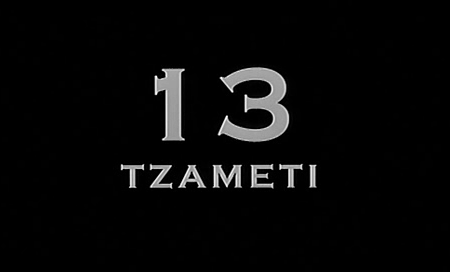
Phew, there we go.
So, obviously, people get shot. In essence, that's what the film is about— (I can see why so many try to hide that fact, now, it's not easy to imbue that description with the excitement abound in its execution)— I hope this little write-up, at least, has been able to communicate how this film about people getting shot is a special one. It's worth your time.
Go and find 13 Tzameti, it's great when you give it a chance.
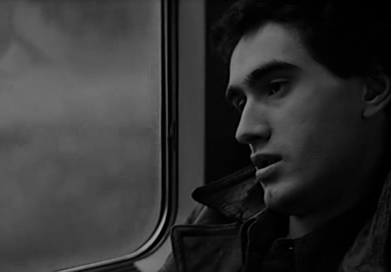
<3